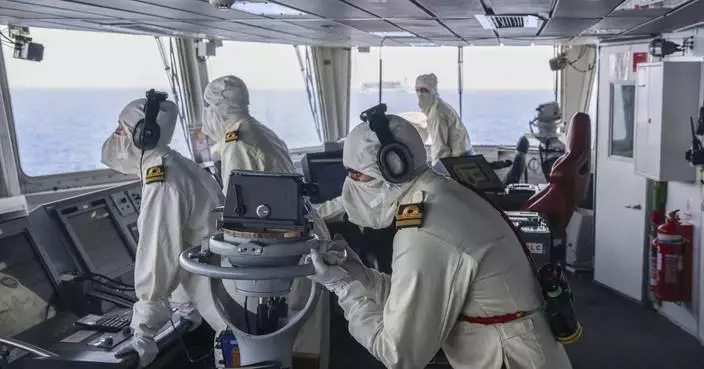A large explosion struck the airport in the southern Yemeni city of Aden on Wednesday, shortly after a plane carrying the newly formed Cabinet landed there, security officials said. At least 16 people were killed and 60 were wounded in the blast.
The source of the blast was not immediately clear and no group claimed responsibility for attacking the airport.
AP footage from the scene showed members of the government delegation disembarking as the blast shook the grounds. No one on the government plane was hurt but many ministers rushed back inside the plane or ran down the stairs, seeking shelter.
Officials at the scene said they saw bodies lying on the tarmac and elsewhere at the airport. The officials spoke on condition of anonymity because they were not authorized to talk to the media.
Yemeni Communication Minister Naguib al-Awg, who was also on the government plane, told The Associated Press that he heard two explosions, suggesting they were drone attacks. Yemeni Prime Minister Maeen Abdulmalik Saeed and the others were quickly whisked away from the airport to the Mashiq Palace in the city.
“It would have been a disaster if the plane was bombed,” he said, insisting the plane was the target of the attack as it was supposed to land earlier.
Mohammed al-Roubid, deputy head of Aden’s health office, told the AP that at least 16 people were killed in the explosion and 60 were wounded.
Images shared on social media from the scene showed rubble and broken glass strewn about near the airport building and at least two lifeless bodies, one of them charred, lying on the ground. In another image, a man was trying to help another man whose clothes were torn to get up from the ground.
The U.N. special envoy for Yemen, Martin Griffiths, condemned the explosion as an “unacceptable act of violence.” He said in a tweet that the attack was “a tragic reminder of the importance of bringing #Yemen urgently back on the path towards peace.”
The ministers were returning to Aden after being sworn in last week as part of a reshuffle following a deal with rival southern separatists. Yemen’s internationally recognized government has worked mostly from self-imposed exile in the Saudi capital of Riyadh during the country’s years-long civil war.
Yemen’s embattled President Abed Rabbo Mansour Hadi, in exile in Saudi Arabia, announced a Cabinet reshuffle earlier this month.
The reshuffle was seen as a major step toward closing a dangerous rift between Hadi's government and southern separatists backed by the United Arab Emirates. The Saudi-backed government is at war with with Iran-allied Houthi rebels, who control most of northern Yemen as well as the country’s capital, Sanaa.
Naming a new government was part of a power-sharing deal between the Saudi-backed Hadi and the Emirati-backed separatist Southern Transitional Council, an umbrella group of militias seeking to restore an independent southern Yemen, which existed from 1967 until unification in 1990.
The blast underscores the dangers facing Hadi’s government in the port city which was a scene of bloody fighting between forces of the internationally recognized government and the UAE-backed separatists.
Last year, the Houthis fired a missile at a military parade of newly graduated fighters of a militia loyal to the UAE at a military base in Aden, killing dozens.
Yemen, the Arab world’s poorest country, has been engulfed in civil war since 2014, when the Shiite Houthi rebels overran the north and Sanaa. The following year, a Saudi-led military coalition intervened to wage war on the Houthis and restore Hadi's government to power.
The war has killed more than 112,000, including thousands of civilians. The conflict also resulted in the world’s worst humanitarian crisis.










